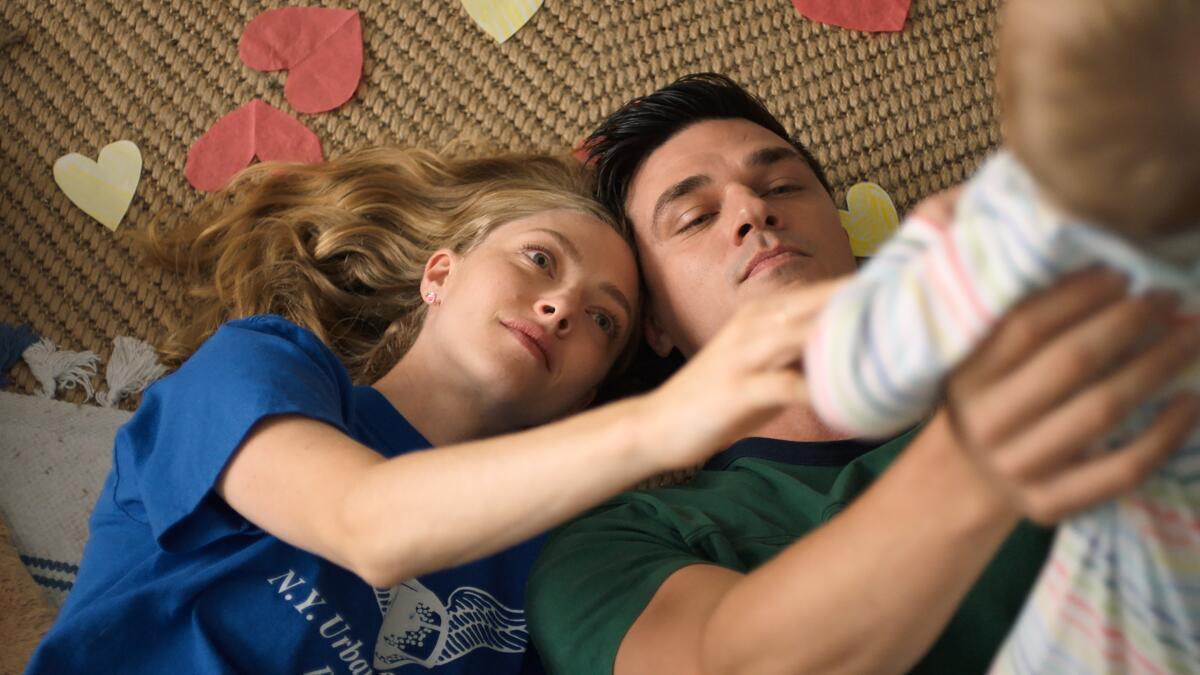Review: ‘A Mouthful of Air’ scratches only the surface of depression sufferer’s pain

- Share via
The Times is committed to reviewing theatrical film releases during the COVID-19 pandemic. Because moviegoing carries risks during this time, we remind readers to follow health and safety guidelines as outlined by the Centers for Disease Control and Prevention and local health officials.
To those without a personal connection to depression, suffusing a film about the subject with color and sunlight could seem incongruous. “A Mouthful of Air” begins with a bright shot of the blue sky, but it quickly becomes clear that Julie Davis (Amanda Seyfried, an Oscar nominee for “Mank”) is drowning in darkness. Her mental state persists despite her love for her new baby, a successful career as a children’s book author and a light-drenched whimsically designed New York City apartment.
But the biggest strength of “A Mouthful of Air” might be that its ability to communicate that depression — particularly the postpartum depression depicted here — isn’t dependent on external circumstances. Unfortunately, the rest of the drama’s crafting is less successful despite its talented cast and goodhearted aims to shed light on a serious issue.
Depression has been a fixture of Julie’s mental landscape since she was a child, but it has gotten worse since the birth of her son, Teddy (Maeve Mosier). A suicide attempt places her under the watchful eye of her husband, Ethan (Finn Wittrock), as well as her mother (Amy Irving) and a psychiatrist (a warm Paul Giamatti). She covers her physical scars with colorful strings of beads and floral scarves, but the pain still resides beneath her skin. With treatment, Julie soon begins to feel better, but she begins to unravel again with her second pregnancy.
In addition to adapting her own novel for the screen, Amy Koppelman (author of “I Smile Back” and wife of “Billions” showrunner Brian Koppelman) makes her directorial debut with this story inspired by her own experiences. With its personal origins and intimate camerawork from cinematographer Frank G. DeMarco, “A Mouthful of Air” should be a moving story about a prevalent issue that deserves more media attention — and hopefully will get more as women are increasingly getting to tell stories in film and TV.
However, almost every aspect of Koppelman’s screenplay lacks precision and depth. There’s scant characterization of anyone on-screen; even second-billed Wittrock’s Ethan is broadly sketched, given the same level of detail as Julie’s stick-figure illustrations. This cinematic fumble is often reserved for the wives in male-centric narratives, but it’s just as unwelcome here. With the exception of a nice moment that illustrates Julie’s creative process, “A Mouthful of Air” is missing the specificity that could help its depiction feel authentic.
The movie’s rhythms and beats, including flashbacks to Julie’s childhood traumas, feel cribbed from dozens of other indie dramas. Its repeated central metaphor — that Julie’s world is in black and white until she improves and color begins to seep back in — is too facile, better suited in its execution for a children’s book rather than a drama for adults. Animated interludes that bring Julie’s illustrations to life drag on for too long and don’t add much to the movie that wasn’t already spelled out too explicitly.
“A Mouthful of Air” means well, but the topic of postpartum depression deserves more depth than it is given here. For a film so grounded in the real-life issue, the movie doesn’t work to make its characters feel human or its world feel real, blunting the emotional impact it could have had.
‘A Mouthful of Air’
Rated: R for some language
Running time: 1 hour, 45 minutes
Playing: Starts Oct. 29 in limited release
More to Read
Only good movies
Get the Indie Focus newsletter, Mark Olsen's weekly guide to the world of cinema.
You may occasionally receive promotional content from the Los Angeles Times.










